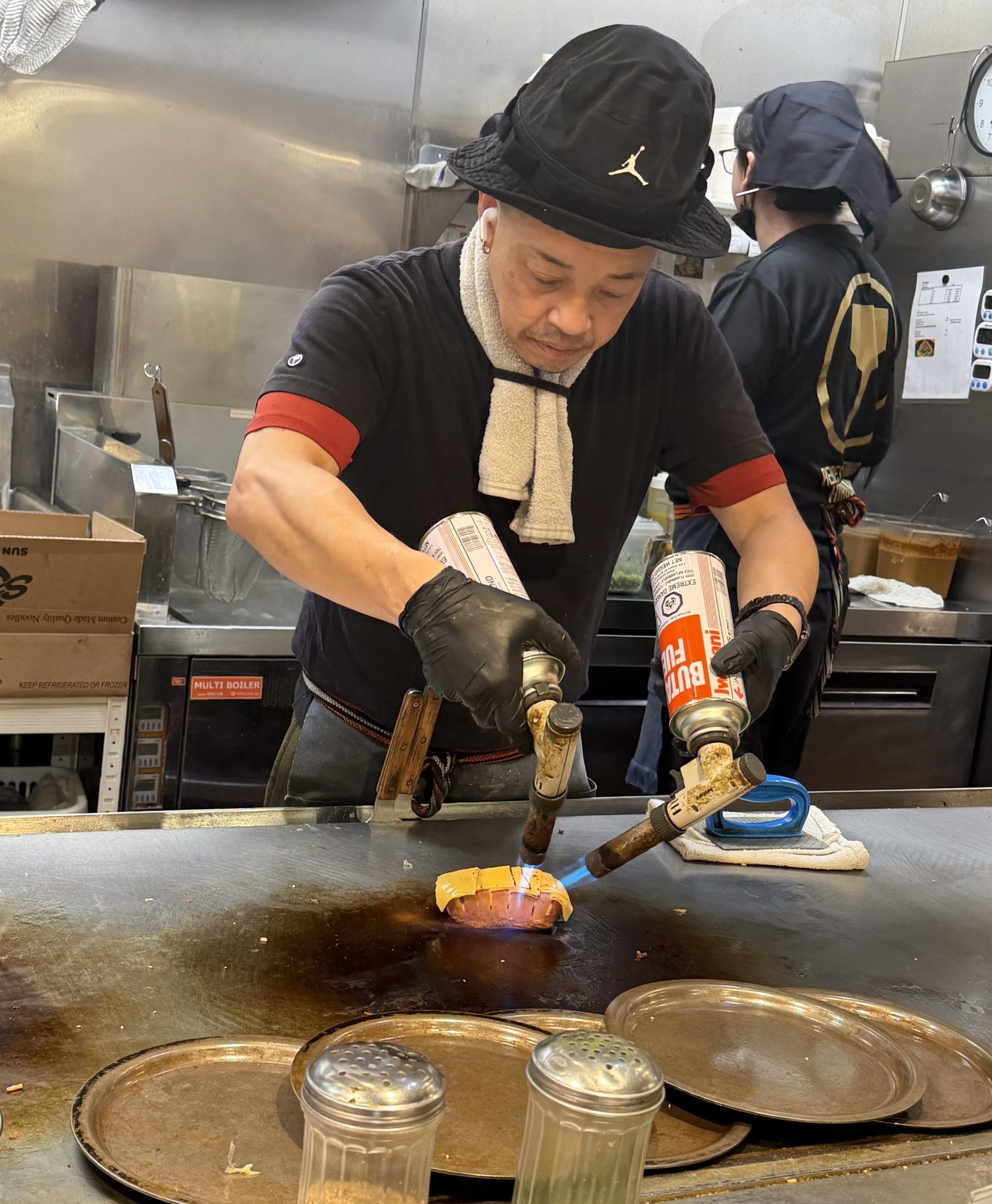
Photo by David Fairchild
(DavidFairchildStudio.com)
PENINSULA BUSINESS
Two for the tiller.
As The Admiral Risty celebrates its 50th year as a beloved, award-winning Palos Verdes eatery, owners Wayne Judah and Jan Jay Judah shared their up-by-the-bootstrap stories.
Wayne, the longtime co-owner and general manager of The Admiral Risty, developed his love of hard work on the family farm. Jan, a longtime realty force in Palos Verdes and the South Bay, became a “worker bee” to rise above hard times early in her life.
The two became full owners of The Admiral Risty last year.
Tradition and Change
Wayne was raised on a farm in Florida, where the family grew cucumbers, tomatoes, bell peppers and citrus fruit, raised livestock and made their own butter. At age 12, he was driving a tractor.
“It’s a bootstrap-type story,” he said.
Wayne left the farm to attend the University of Florida, but as Jan related, he would soon return.
“When his father passed away, when Wayne was in his late teens, he left college to go back to the farm and bring in the crops, to help his mother pay the bills,” Jan said. “That’s the kind of guy he is.”
In the 1960s he was drafted into the U.S. army, served in Vietnam and was promoted to sergeant. He landed in San Pedro, where he was stationed at Fort MacArthur as a communications specialist. He also took on a weekend job that would give him his entry into The Admiral Risty.
“I always felt I needed more income, and I had the time, so I went to the officers’ club, and they were willing to train me as a bartender,” he said.
When his stint in the Army ended, Wayne took his bartending skills to the Risty.
He also took flying lessons, and flirted with making his living in the air.
“As a young kid I always wanted to be a pilot, so I got flying lessons on the GI Bill at the Torrance airport. I got my pilot’s license and I was working toward my commercial [license], but there weren’t a lot of jobs,” Wayne said.
“A lot of people love to fly, but it’s not as exciting as I thought it would be. I liked dealing with people better. [The restaurant business] is a lot more fun, more entertaining. It’s a social thing. It’s a social business,” he said.
His role in The Admiral Risty expanded as he began ordering its liquor, food and meat. In time he became co-owner and general manager, guiding the Risty through decades of carefully managed changes, within its traditions of quality and hospitality.
“In the ‘60s when the restaurant opened, beef was king. We had one chicken dish and one fish dish, broiled sea bass. It was a much more limited menu than it is today,” Wayne said. “In the mid to late ‘70s people began to get into more healthy dieting,” which led to an expanding menu with a much greater emphasis on fish.
But the mainstay signature dish, Risty’s flank steak, continues to be ordered as much as any other entrée.
Other popular items include an award-winning cioppino, Belgian waffles with fresh compote for brunch, and salads with freshly-baked croutons and the restaurant’s blue cheese dressing.
The Risty cold-cures its own gravlax as well.
Over the years the restaurant’s beverage list has been expanded to include more than 150 California and imported wines.
“We bake our own desserts and we bake our own breads,” Wayne said. “We have vegetarian dishes now. We’re always adjusting our menu.”
The changes in Risty’s menu are made only with great care.
“We worked with the bread for a year before we put it on the table. Some we would throw out, some we liked, some we needed to make adjustments to,” Wayne said. “We consulted with the best bakeries on the processes to use. We want to do it well if we are going to do it.”
Five different entertainers work six nights a week in the restaurant’s lounge, where patrons can be served full meals as well as drinks.
All the while, Wayne has been out front, greeting guests as they arrive.
“It’s like we’re throwing a party, having a good time. It’s a very social environment. We have lots of fun, there’s entertainment, as well as meals and a view of the ocean,” Wayne said.
“We enjoy people coming to see us. There are lots of rewards that are personal rather than financial.”
He likened the cyclic nature of the restaurant to that of the old family farm.
“It was a truck crop situation. You get the land prepared, you plant the crops, you fertilize the product, you till the soil, you spray the plants, you harvest the product, you start all over again.”
At the Risty, “You get the raw materials, you process the materials, you take the product to the table, you service the product, and you clean up the plates.”
“The restaurant business sounds glamorous, but it’s not all glamorous,” Wayne said. “A lot of investors think they want to go into the business, but they quickly find out what it involves. If the deep fryer breaks you have to get it fixed. If the dishwasher breaks, the hot water heater breaks, you have to fix that now, not later. There’s a lot of pressure on those things.”
An ongoing 50th anniversary celebration at the restaurant includes a weekly drawing for a $50 Admiral Risty gift certificate.

(DavidFairchildStudio.com)
Of cats and milk crates
Turning to the seemingly unrelated topic of cats, Jan revealed that Wayne can be “a real softie” when it comes to felines and other animals. She learned this as she watched him feed restaurant leftovers to a colony of feral cats in a then-undeveloped canyon next to the Risty.
“I think I fell in love with Wayne the night I saw him sitting on a milk crate in the parking lot behind the restaurant with his favorite feline, Nigh Nigh, sitting in his lap basking in the affection that Wayne was supplying,” Jan said.
“Nigh had been the toughest, most irascible member of the colony at one point but was now an older cat who would soon become stone deaf,” she said. “Eventually, he came to live with us after we were married, joining our other two cats Alli and Gator, and he enjoyed a stress free last few years with us at our then Malaga Cove home.”
Working with veterinarian Cassie Jones, Wayne found homes for most of the rest of the cats.
Real estate prowess
Jan Jay Judah has been a force in Palos Verdes and South Bay real estate for more than three decades, specializing in corporate relocation in partnership with her son Evan Jay.
Clients include TRW, Xerox, AIG, PepsiCo, MCI, Ernst & Young, Sony Corporation, Columbia Pictures, Boeing Corp., Herbalife, Activision and the FBI. The Jay-Judah Group is associated with REMax Palos Verdes and Execs.
The partners have been recognized with awards including installation in the REMax Hall of Fame and the 100 Percent Club, which is reserved for agents closing more than $3 million in real estate transactions within a calendar year.
Jan Jay Judah’s production places her within the top 5 percent of agents nationwide.
Alaska gold
“I was born in Seattle into a prominent, entrepreneurial up-from-the-bootstraps, colorful cast of family characters,” Jan wrote in a thumbnail memoir.
Her maternal grandfather Fred McCoy was a gold miner in Alaska during the Klondike era. He and a partner “actually hit pay dirt” with a successful claim that they later sold to a mining syndicate.
That “made his fortune, and ensured that my mother grew up in a privileged environment,” Jan recalled.
McCoy and Jan’s two uncles traveled frequently to Seattle, and Jan grew up hearing stories about the adventurers’ raft capsizing in a river, and the group being charged by a grizzly bear.
“The ring my sister wears today was my grandmother’s wedding ring, which my grandfather won in a poker game while on a steam ship en route to Alaska,” Jan recalled.
“Apparently, the family fortunes ebbed and flowed during the depression, and in ensuing years my grandfather and his sons built homes in Seattle and owned a grocery store,” she wrote. “But most of the mining fortune was dissipated long before I was born.”
Her father, Bill Golden, was a journalist. Chet Huntley was his best man when he married Jan’s mother, Marjorie “Midge” McCoy.
Her father became press secretary for U.S. Sen. Warren Magnuson, and the family moved to Washington DC and later returned to Seattle.
Hard times, Hard work
When Jan was 10, her father died suddenly and her 16-year-old brother was killed in an accident. Her mother took a job in Anchorage, Alaska, “but had trouble coping with her losses,” Jan recalled. “As a 12-year-old I was pretty much on my own in a very rough environment during the year we spent in Alaska.”
Through the rough times, the family managed to avoid homelessness, and Jan found solace in reading voraciously.
“The library was my sanctuary,” she said.
“Alaska was still a territory – not even a state – at the time we were there, and it was not unusual to see an occasional moose stroll through the main part of town,” she said.
The family moved to the Los Angeles area, and at 17 Jan began supporting herself with administrative and accounting work, while studying a full academic load at Santa Monica College at night.
“Marriage interrupted my education and I had two sons, Evan, now my partner in our real estate practice, and Brad, who works in the insurance industry in San Diego,” she said.
Later, as a single mom, she moved to Palos Verdes and began her real estate career.
“I found having two mouths to feed to be highly motivating,” she recalled.
“My sales career evolved slowly but steadily and the cliché ‘the harder you work, the luckier you get’ proved true for me,” Jan wrote.
At different times, both her sons worked for Wayne at The Admiral Risty.
“I remember once calling Wayne to complain about the number of hours my then-high-school-aged son was working and Wayne informed me, politely but firmly, that while he was sympathetic to my concerns – I quote – ‘Ma’am, I have a business to run,’” she recalled.
“Basically, he shut me down in no uncertain terms. The upside though was that Wayne proved to be an outstanding mentor, not just for my sons but for generations of young people on the Peninsula.”
“Even I was influenced by Wayne – and although I always worked hard prior to meeting and later marrying him – I found myself redoubling my efforts becoming a real worker bee just by being in his presence. I later established a second business as a travel agent while still working successfully at real estate full time.”
After all their work, and their successes, the Judahs are in a great position to enjoy the fruits of their labors – and probably put in some more hard work. PEN








